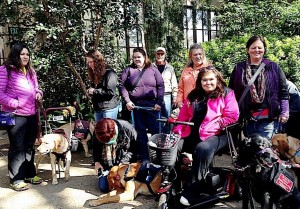A companion that can alert a diabetic to low or high blood sugar
By Rick Marts, Staff Writer, Kennett Times

Service dogs change the lives of people. Canine Partners for Life professional trainers and volunteer handlers on a ‘socialization’ trip to Longwood Gardens.
Most of us have had a dog in our lives at some point. But how many have known a dog that could sense when its owner was about to have a seizure; take money to a store counter, pay for merchandise, and bring back the change; and make up for its owner’s disability in hundreds of other ways, while also offering unconditional love?
Canine Partners for Life (CPL) is an organization that produces just that kind of dog, and its facilities are here in our own Chester County backyard. On its 45 acres of farmland in nearby Cochranville (west for 12 miles on Rt. 926 from Rt. 82), CPL’s 24 staff members have been training service dogs and residential companion dogs for over 25 years, placing over 600 dogs in 43 states.
After two years of training, CPL places its dogs with individuals—children through older adults—who have a wide range of physical and cognitive disabilities, including mobility impairments and balance disorders, difficulty using their hands and arms, health related fatigue issues, and seizure disorders.
Bringing a dog to the point where it is 100 percent reliable in all situations is costly, though. CPL estimates the total cost to raise, train, place, and provide lifetime support for each dog to be more than $27,000. Of course, recipients do not pay that much; instead, they are asked for a donation ranging from $1,000 to $3,000, and no one is denied a canine partner if they cannot meet that request.
To make up the $25,000 in expenses to get a dog ready for a human partner that are not borne by that partner is the job of two other sides of the CPL organization, namely, the fundraising program and the over 200 dog-loving volunteers who give their time.
“Fundraising never stops,” said Andree Jannette, CPL’s associate director of marketing and public relations. She also said that “this year we are launching our 25th anniversary capital campaign with an event called Unleashed and Uncorked.”
To say the least, Unleashed and Uncorked will be a gala event, featuring al fresco dining, dancing, and auction bidding on one-of-a-kind items and experiences. It will be held May 10, 2014, at Heartwood Farm in Newtown Square, PA. Visit http://k94life.org/events/17/unleashed-uncorked for more details.
Volunteering is also non-stop. Dogs grow up quickly, and little time can be wasted allowing them to snooze idly on the sofa or chew up dad’s new slippers out of boredom. With the exception of professional training, most of the contact CPL dogs have with humans is with volunteers who bathe, provide cuddle time, exercise, obedience train, and socialize them in real world situations. CPL dogs are likely to be seen practicing their skills at Exton Mall, Longwood Gardens, Winterthur Museum, and anywhere else the public is allowed to go.
Even after 25 years, CPL is planning new uses for its dogs. Jannette said, “CPL’s strategic plan calls for identifying new recipient populations and environments in which service and companion dogs might provide benefits.” In particular, she said, “CPL sees new opportunities for its dogs with autistic children and diabetics.”
Whereas a dog cannot be trained to recognize the onset of an epileptic seizure, by trial and error CPL can identify those dogs that have this innate ability and, after appropriate obedience and other training, can place them where needed. On the other hand, CPL does have a technique for training a dog to alert an owner with high or low blood sugar, the salient effects of diabetes.
Training a service dog to be sensitive to blood sugar levels is highly labor-intensive, however, according to Jannette. She said, “CPL has had research going on over the past couple of years and now has a training regimen that uses high and low blood sugar samples of a prospective diabetic recipient’s saliva. And CPL is one of the leading facilities in the nation for this aspect of dog training.”
Imagine the freedom that a service dog brings to its partner–24 hours a day, 365 days a year. A person partnered with a service dog has full public access rights as granted by federal law (The Americans with Disabilities Act), which allows them to take their dog into all public facilities, shopping centers, libraries, museums, schools, and, well, the list is endless.
For more information on their fundraising opportunities, volunteering, or CPL in general, please visit them online at www.k94life.org.






